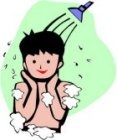
Worksheets and No Prep Teaching Resources
Reading Comprehension Worksheets
Hygiene

Hygiene
 Worksheets and No Prep Teaching Resources Reading Comprehension Worksheets Hygiene |
 Hygiene |
| edHelper's suggested reading level: | grades 5 to 8 | |
| Flesch-Kincaid grade level: | 5.32 |
|
Acne
By Cindy Grigg |

|
 1 Acne is a skin condition caused by over-active oil glands in the skin. Changes in hormones are a normal part of adolescence. These changes cause the oil glands to secrete more oil than usual, leading to acne. Most teens have acne at some time in their teenage or pre-teen years. Usually it is mild and can be treated at home. For serious cases, you might want to see a dermatologist, a doctor who treats the skin.
1 Acne is a skin condition caused by over-active oil glands in the skin. Changes in hormones are a normal part of adolescence. These changes cause the oil glands to secrete more oil than usual, leading to acne. Most teens have acne at some time in their teenage or pre-teen years. Usually it is mild and can be treated at home. For serious cases, you might want to see a dermatologist, a doctor who treats the skin. |
Create Weekly Reading Books
Prepare for an entire week at once! |
| Leave your feedback on Acne (use this link if you found an error in the story) |
 |
Hygiene
|